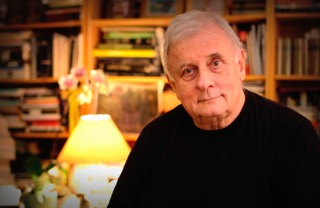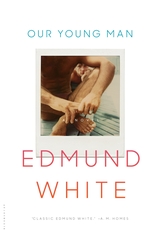Interview: Edmund White
 Midwestern Gothic staffer Giuliana Eggleston talked with author Edmund White about his novel Our Young Man, the era of supermodels, the difficulty of writing about same-sex love, and more.
Midwestern Gothic staffer Giuliana Eggleston talked with author Edmund White about his novel Our Young Man, the era of supermodels, the difficulty of writing about same-sex love, and more.
**
Giuliana Eggleston: What’s your connection to the Midwest?
Edmund White: I was born in Cincinnati, lived in Evanston, Rockford, Detroit and Ann Arbor. I went to Cranbrook in Bloomfield Hills, Michigan and the University of Michigan in Ann Arbor. At 22 I moved to New York. The dedicatee of my novel, Christopher Bollen, is also from Cincinnati
GE: Your new novel, Our Young Man, follows Guy, a french model at the top of the New York fashion world of the 70’s and 80’s, with looks that appear inexplicably young well into his 30s. What steps or research did you undertake to accurately describe the New York fashion world at that time?
EW: Throughout the 80s I worked for American Vogue (but in Paris). I interviewed lots of models, agents, editors and hair stylists.

GE: Your new novel deals with the idea of living a life of luxury at a cost, as well as the importance of appearances over personal depth. Why did you choose to write about these binaries that shed light on the pitfalls of what appear to be a glamorous life?
EW: I’ve always been interested, like most people, in physical beauty and I’ve know beauties of both sexes—actors, models, dancers, athletes.
GE: You show how the lie Guy lives hinders aspects of his life – like finding love and being valued for more than just his physical beauty. How do you feel the lie Guy tells about his age in order to secure wealth relates to lies people tell everyday?
EW: Guy is fairly innocent, certainly clueless. He’s anything but a schemer. His manager, Pierre-Georges, is the real schemer.
GE: What made you choose the background of the disco era and the danger of AIDs for this novel? Do you see Guy’s survival as being both personal and representative of the era?
EW: I chose 1980 because that’s the moment models became super-models and people started knowing their names. Both Club 7 in Paris and Studio 54 in New York were an electric combination of straight and gay, men and women, celebrities and climbers. Like Guy, I’m a survivor of that tragic era.
GE: How have your life experiences influenced your writing? From where do you draw your inspiration?
EW: Many of my books (not this one) have been autobiographical. As a midwesterner who lived in New York and Paris, I’ve been “initiated” twice over.
GE: You have been writing about same-sex love for much of your writing career, which started in the early 70’s. How has writing about same-sex love changed over time? What obstacles did you initially face, and what obstacles do you still face?
EW: In the 60s my fiction wasn’t published. Even gay editors were afraid to touch it. The wonderful woman reviewer in the New York Review, Diane Johnson, admitted that she felt alienated by gay sex. I hear that from many even sophisticated readers. It’s what I call the “cock and balls” problem — hard to swallow for the general public. Whereas black fiction and Asian fiction and women’s fiction crossed over to the mass market, gay writing has been harder to assimilate. Now that gays are getting married and divorced and having children, maybe their experiences will be easier to identify with.
GE: What’s next for you?
EW: Now I’m writing a memoir about a life of reading.
**
Edmund White has written some twenty-five books and edited several anthologies. He is perhaps best known for his biography of French writer Jean Genet, for which he won the National Book Critics Circle Award. He is also the author of a trilogy of autobiographical novels — A Boy’s Own Story, The Beautiful Room is Empty, and The Farewell Symphony. His novel, The Married Man, takes place in France, the United States and Morocco and deals with the intimate psychological repercussions of AIDS. He has written brief lives of Marcel Proust and Arthur Rimbaud and a book about unconventional Paris called The Flaneur. His most recent published works of fiction are Chaos and Hotel de Dream and Jack Holmes and His Friend and a recent non-fiction book is City Boy, a memoir about New York in the 1970s. His memoir, Inside a Pearl: My Years in Paris, came out in 2014. In 2016 he published a novel, Our Young Man. He has been named the official author for the State of New York, he is a member of the American Academy of Arts and Letters and an officer in the French Order of Arts and Letters and a winner of the France-Amériques award and of the Mondello prize in Sicily. He teaches writing at Princeton and lives in New York City.






